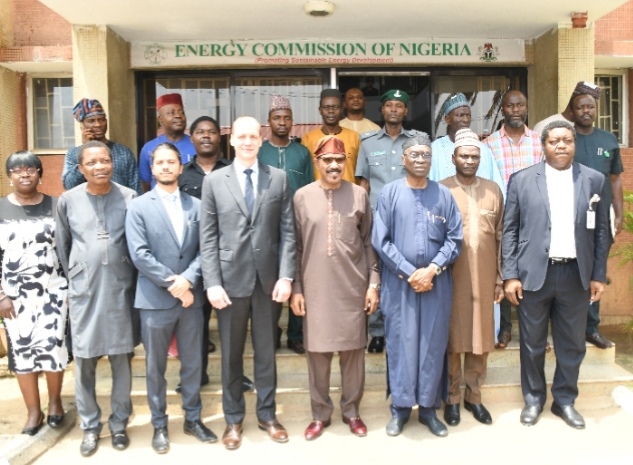Photo Caption:
Minister of Science, Technology and Innovation, Dr. Adeleke Olorunnimbe Mamora (4th right); Director-General Energy Commission of Nigeria (ECN), Prof. Eli Jidere Bala (5th left); representative of the National zonal office, Federal Ministry of Environment, Mr. Nurudeen Yaru, (2nd right); Superindent of Customs Mr. Suleiman Bala (4th left) and other members of the National Technical Committee on Sustainable Cooling in Nigeria, in a group photograph during the National Stakeholders’ Consultative Workshop on Energy Efficient and Climate-Friendly Cooling on Thursday in Abuja.
By Charles Okonji
The Minister of Science, Technology and Innovation, Dr. Adeleke Olorunnimbe Mamora, has stated that Nigeria through its National Energy Policy has joined the rest of the world in recognising energy efficiency as one of the most cost-effective means of providing energy security, increase economic productivity, reduce local air pollution to enhance mitigation of Greenhouse Gas (GHG) emission.
Dr. Mamora disclosed this at a one day National Stakeholders Consultative Workshop on Energy Efficient and Climate Friendly Cooling organised by the Energy Commission of Nigeria (ECN) today in Abuja.
“It is estimated that by 2030, there will be an unconditional greenhouse gas emission reduction by 20 percent and a conditional reduction target of 47 percent below the business as usual (BAU).
To achieve unconditional target of 2.5 percent reduction in energy intensity of climate change mitigating priority measures, the energy efficiency best practices across various sectors should be meticulously implemented,” he emphasized.
The Minister noted that Nigeria being the largest market in Africa with the current growing population, combined with improving life style, urbanization and rising global warming, will continue to experience growing demand for air conditioners (ACs) refrigerators and other cooling devices, thereby, becoming one of the fastest growing ACs and refrigerators market in the world.
He explained that most of the ACs utilized in the country have energy efficiency ratio (EEF) which is below acceptable minimum energy performance standards (MEPS) and then charged the participants in the workshop to proffer lasting solutions to the problem.
He stressed that the workshop will also foster the transfer of technical know-how which will enhance promotion of the adaptation of energy efficient and climate friendly cooling systems in the country.
Earlier in his speech, the Director-General of the Energy Commission of Nigeria, Professor Eli Jidere Bala, stated that the Commission is charged with the responsibility of planning and coordination of National Policies in the field of energy in all ramifications.
Bala noted that the Commission liaises with international organisations, on energy matters such as United Nations Environment Programme (UNEP) International Renewable Energy Council and International Energy Charter amongst others.




